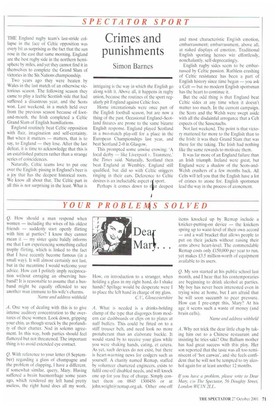Crimes and punishments
Simon Barnes
THE England rugby team's last-stride collapse in the face of Celtic opposition was every bit as surprising as the fact that the sun rose in the east that same morning. England are the best rugby side in the northern hemisphere by miles, and yet they cannot find it in themselves to complete the Grand Slam of victories in the Six Nations championship.
Two years ago they were beaten by Wales in the last match of an otherwise victorious season. The following season they came to play a feeble Scottish side that had suffered a disastrous year, and the Scots won. Last weekend, in a match held over from the previous season because of footand-mouth, the Irish completed a Celtic Grand Slam of English humiliations.
England routinely beat Celtic opposition with flair, imagination and self-certainty. But when it matters — matters, that is to say, to England — they lose. After the last defeat, it is time to acknowledge that this is an established pattern rather than a strange series of coincidences.
Naturally, Celtic teams love to put one over the English: pissing in England's beer is a joy that has the deepest historical roots. We know all about that. The Celtic part in all this is not surprising in the least. What is intriguing is the way in which the English go along with it. Above all, it happens in rugby union, because the routines of the sport regularly pit England against Celtic foes.
Home internationals were once part of the English football season, but are now a thing of the past. Occasional England–Scotland fixtures are prone to the same bizarre English response, England played Scotland in a two-match play-off for a place in the European Championships last year, and beat Scotland 2-0 in Glasgow.
This prompted some unwise crowing: 'A local derby — like Liverpool 1.,, Tranmere,' the Times said. Naturally, Scotland then beat England at Wembley. England still qualified, but did so with Celtic sniggers ringing in their ears. Deference to Celtic
desires is an ineluctable aspect sport.
Perhaps it comes down to t t deepest and most characteristic English emotion, embarrassment; embarrassment, above all, at naked displays of emotion. Traditional English sporting heroes win effortlessly, nonchalantly, self-deprecatingly.
English rugby sides seem to be embarrassed by Celtic passion. Ruthless crushing of Celtic resistance has been a part of English history since time began — you ask a Celt — but no modern English sportsman has the heart to continue it.
But the odd thing is that England beat Celtic sides at any time when it doesn't matter too much. In the current campaign, the Scots and the Welsh were swept aside with all the disdainful arrogance that a Celt expects of the Sassenachs.
Not last weekend. The point is that victory mattered far more to the English than to the Irish: it was their Grand Slam that was there for the taking. The Irish had nothing like the same rewards to motivate them.
It was far more of an England failure than an Irish triumph. Ireland were great, but England were a shadow of the Scots-andWelsh crushers of a few months back. All Celts will tell you that the English have a lot of crimes to atone for, English sportsmen lead the way in the process of atonement.










































































 Previous page
Previous page